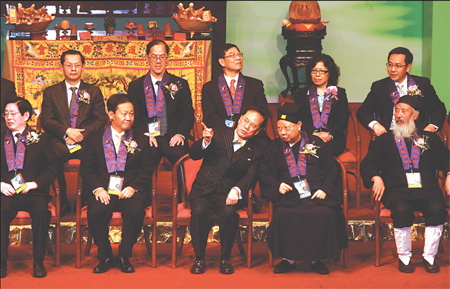Taoist Association asks Laozi's birthday be declared a statutory holiday
Updated: 2010-03-30 07:36
By Guo Jiaxue(HK Edition)
|
|||||||||
|
Chief Executive Donald Tsang (center) and Director of the Central Government's Liaison Office in Hong Kong Peng Qinghua (2nd left) officiate at the opening ceremony of the 10th Taoist Festival at Queen Elizabeth Stadium Monday. EDMOND TANG / CHINA DAILY |
Hong Kong's Taoist Association wants the SAR to declare Laozi's birthday a statutory holiday. Laozi is the philosopher whose writings formed the basis for the Taoist faith.
Laozi's birthday falls on the 15th day of the second lunar month. The official application will be submitted to the government within the coming week, said Leung Tak-wah, Vice-chairman of the Association, at the opening ceremony of the 10th Taoist Festival Monday.
A survey conducted by the University of Hong Kong shows that over 40 percent of interviewees favor the idea.
Tong Wai-ki, Chairman of the Association, voiced the opinion that declaring Laozi's birthday a public holiday actually would be a reflection of Hong Kong's local culture.
"Although not many people believe in Taoism, the traces of Taoism can be seen very often in the daily life of Hong Kong people, such as worship of Wong Tai Sin, Guanyin, Guan Yu, Tai Sui, and Mazu. Even Qigong, Tai Chi Chuan and other traditional sports for maintaining health all are closely related to Taoism," Tong said.
"It (celebrating Laozi's birthday) is a practice of respecting the tradition and Chinese culture," he added.
The survey also studied Hong Kong citizens' knowledge and participation in Taoist-related activities. It shows a half of interviewees can correctly name at least one Taoist immortal or custom. "The most well-known immortal is Wong Tai-sin, followed by Guanyin and Lu Tung-pin," said Robert Chung, Director of the Public Opinion Programme at The University of Hong Kong.
He indicated that although only 2 percent of interviewees consider themselves Taoists, nearly 70 percent of them have participated in Taoist-related activities at home or at temples. This includes worship, incense burning, divination and asking for blessings.
The Association also noted more than 1.35 million people visited six leading Taoist temples in Hong Kong during the Lunar New Year, including Ching Chung Koon, Yuen Yuen Institute, Fung Ying Sin Koon, Wun Chuen Sin Koon, Che Kung Temple, and Wong Tai Sin Temple.
In the application, the Association won't specifically request the observance be listed among general holidays or labor holidays, but leave the decision to the government, including whether to add one more holiday or remove another holiday to keep the total number of days unchanged. "We apply with an open attitude," Leung stressed.
The Association is already prepared for a long-term effort. "One application may not be enough, we will apply for it every year afterwards, keep promoting the Taoist culture , and contribute to charitable causes to gain public recognition," Leung said. The Association will develop a hospice service. It took 10 years to designate Buddha's birthday a public holiday, Tong noted.
The application from the Taoist group came after the Confucian Academy's proposal to include Confucius's birthday among Hong Kong's public holidays. That proposal was rejected on the grounds that a broad consensus had not formed in society. The government added promoting Confucian thought and declaring changes in public holidays were two different matters.
Taoism is a native Chinese religion. The philosophy of Taoism is based on Dao De Jing, written by Laozi. The text elaborates principles of peace, nature, non-action, and the relationship between humanity and the cosmos. It has a history of over 2,000 years.
(HK Edition 03/30/2010 page1)
